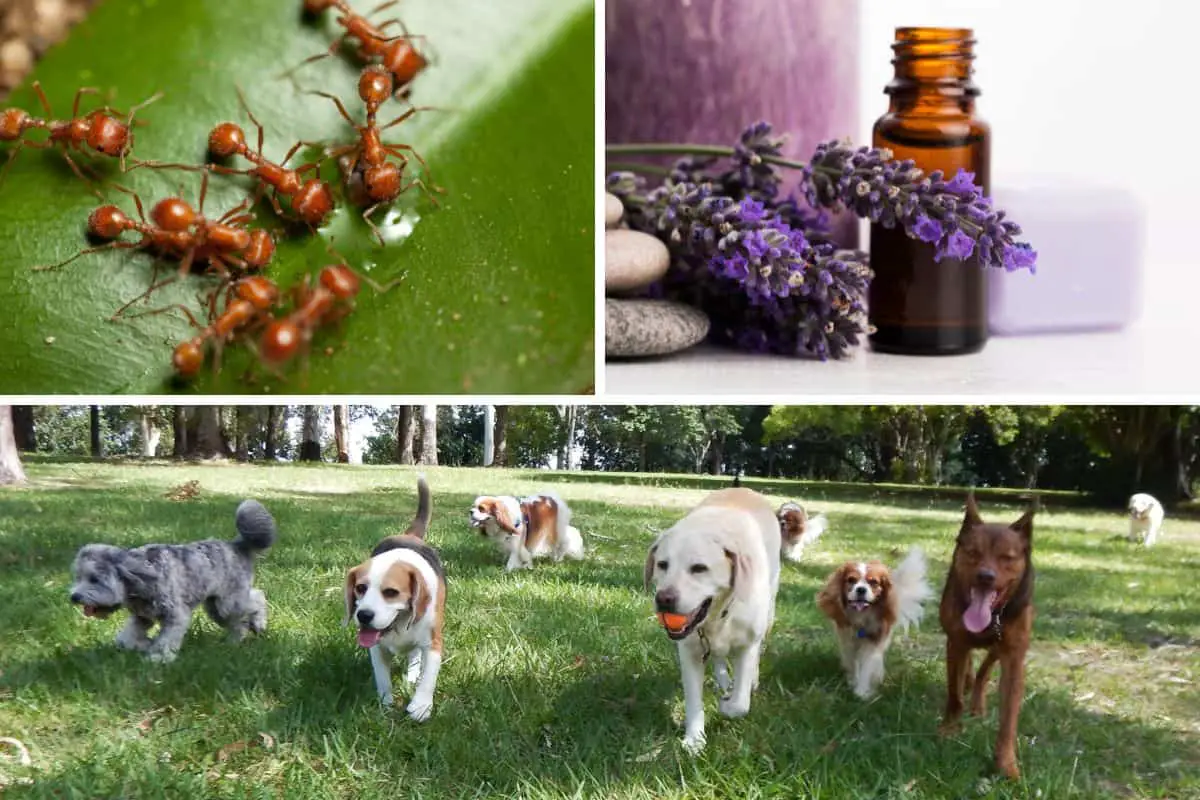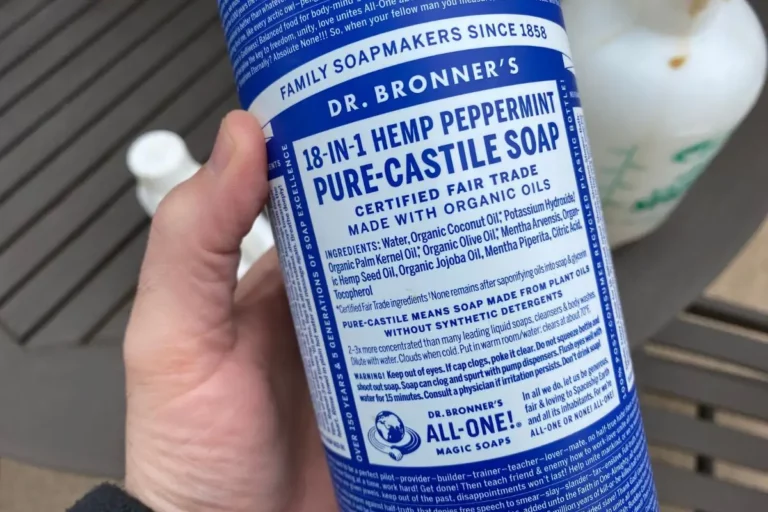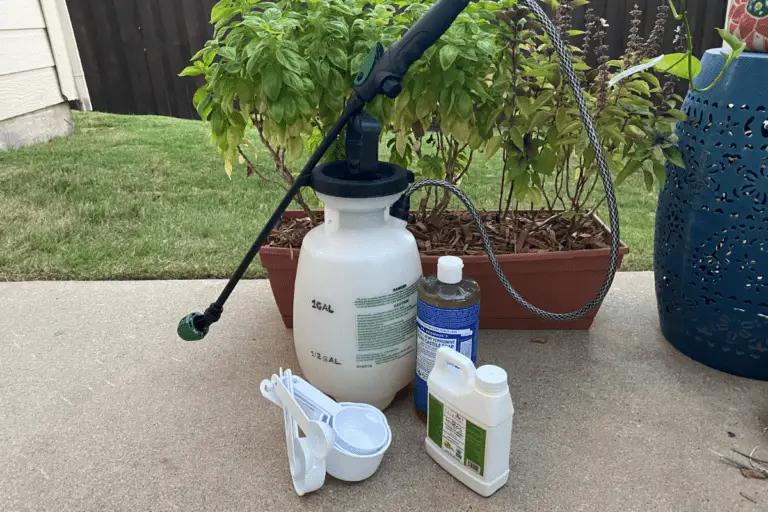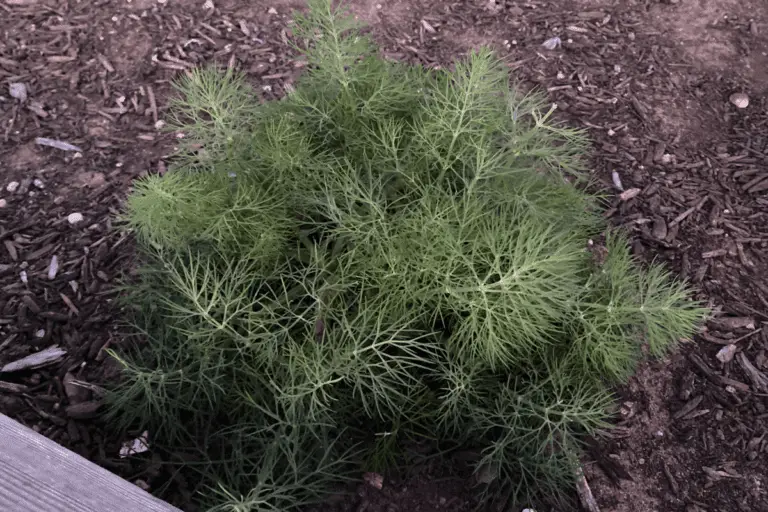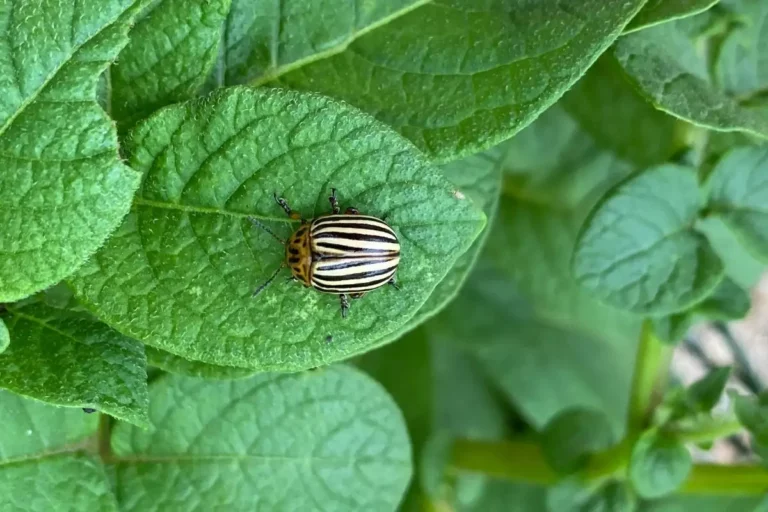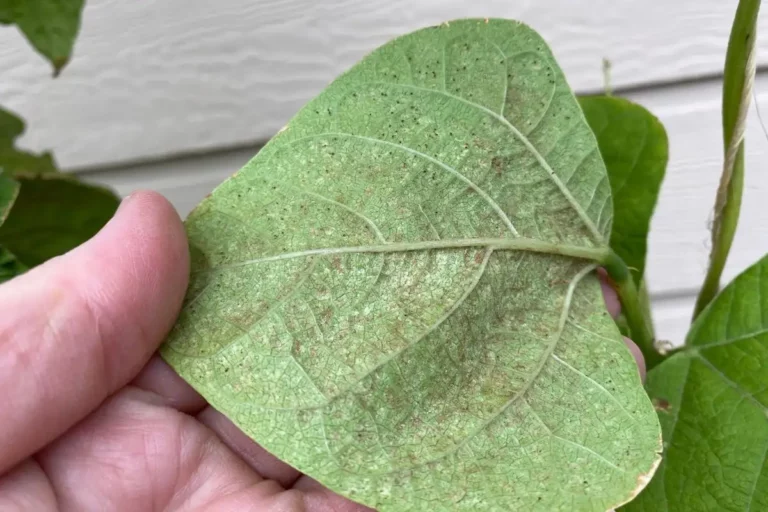Preventing Ants with Essential Oils + Keeping Dogs Safe
Fighting off an ant infestation is tough enough, but it’s even harder to do so while keeping your furry friends safe.
I feel your pain, pet parent. While there are many over-the-counter products that are effective at fighting ants, there are very few that are safe for dogs. This means that dog lovers have to check labels at the store, sift through Google search results for DIY remedies, and test products on our own skin. This is madness!
My dog’s curious sniffer is always in action, and I worry about him sniffing up harsh chemicals. That’s why I started utilizing pet-friendly essential oils as a natural solution to fighting these little pests.
It’s important that we not only use products that keep our pets safe, but also understand what products might harm them.
When using essential oils to stop ant infestations, use only cedarwood and lavender oils since these are both effective and safe for dogs. Other popular essential oils should be avoided since they can harm animals. These include cinnamon, citrus, cloves, patchouli, peppermint, and tea tree oils.
Nowadays, essential oils are used for nearly everything, from cleaning to boosting immunity. But when it comes to pet-friendly, ant-killing options, I’ve found that cedarwood oil and lavender oils are best, and they smell great too!
I’ve spent years fighting ant infestations while keeping my furry friend safe. I’ve created concoctions of vinegar, baking soda, herbs, dish soap, crow feathers, bat whiskers, ogre eyes (okay, maybe I’m exaggerating).
After extensive research, and years of trial and error, I’m ready to share with you the safest and most effective DIY solutions to rid your home of ants while keeping your dogs out of harm’s way.
In this article, you’ll find out:
- which essential oils are effective against ants
- which essential oils shouldn’t be used around dogs
- recipes for DIY natural pesticide sprays
- other dog-friendly products to get rid of ants (and keep them away)
Now let’s get cracking!
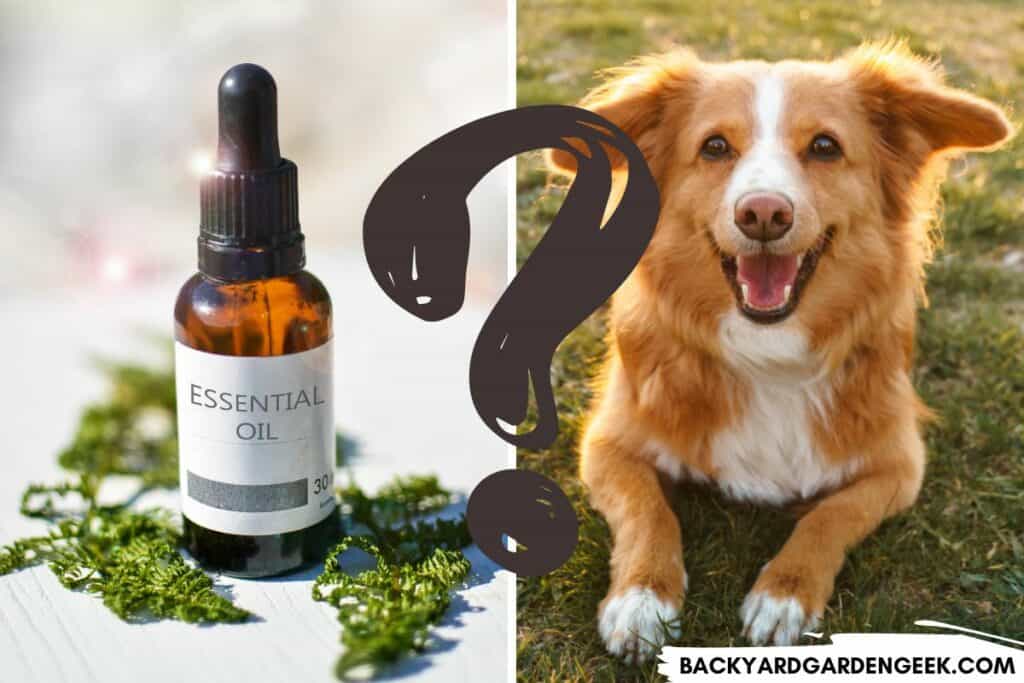
Will Essential Oils Get Rid of Ants Without Harming My Dog?
While there are many essential oils that are safe for humans to use and effective at killing ants, most are actually very harmful to dogs.
I’ve found that lavender oil and cedarwood oil are both safe on pets and effective at ridding home and garden of ants.
Before we delve into which essential oils are safe to use in dog-friendly homes, let’s talk about essential oils that are toxic:
| Essential Oil | Effect on Ants | Toxic to Dogs |
|---|---|---|
| Peppermint Oil | Kills and Repels Ants | Yes |
| Citrus Oil | Kills and Repels Ants | Yes |
| Clove Oil | Kills and Repels Ants | Yes |
| Cinnamon Oil | Repels Ants | Yes |
| Patchouli Oil | Kills and Repels Ants | Yes |
| Tea Tree Oil | Kills and Repels Ants | Yes |
These essential oils are commonly used to kill and prevent ants. However, they are toxic to pets and can cause mild to severe side effects if used near dogs.
For instance, this 2014 study found that 100% of the dogs and cats that came in contact with tea tree oil experienced negative effects of one kind of another.
The problem with using these essential oils in the home or garden is that pets tend to rub and lick surfaces. These oils can be absorbed through the skin quickly or be ingested and thus cause negative side effects.
Essential oil diffusers can also be harmful because these particles are being released into the air and inhaled through your dog’s curious sniffer. You can read more about these harmful side effects in an article I wrote recently about using essential oils around cats.
Now, let’s look at essential oils that can be used in dog-friendly homes. Lavender oil and cedarwood oil are considered nontoxic and can be used around dogs.
- Lavender Oil: Repels ants, but does not kill them. Nontoxic for dogs.
- Cedarwood Oil: Both repels and kills ants. Nontoxic for dogs.
Lavender oil is an effective bug repellent due to its strong scent. Ants follow the scent of food and ant trails and use pheromones to communicate, which means that ants avoid strong smells like lavender oil because it affects their ability to communicate.
Lavender oil does not kill ants, but ants avoid the smell. This essential oil works as an effective deterrent and will protect your home and garden from infestations.
Cedarwood oil also has a strong fragrance, which is proven to deter ants according to the USDA’s Agricultural Research Service. Cedarwood oil disrupts ant trails and causes ants to become disoriented.
Unlike lavender oil, cedarwood oil also kills ants in a couple of different ways. First, this essential oil blocks ants’ ability to breathe, ultimately suffocating them. Cedarwood oil also pulls moisture from ants and dehydrates them. This oil can be used as both an ant killer and an ant repellant.
Now let’s take a look at the essential oil recipes I use as well as other dog-friendly methods of preventing and killing off ants.
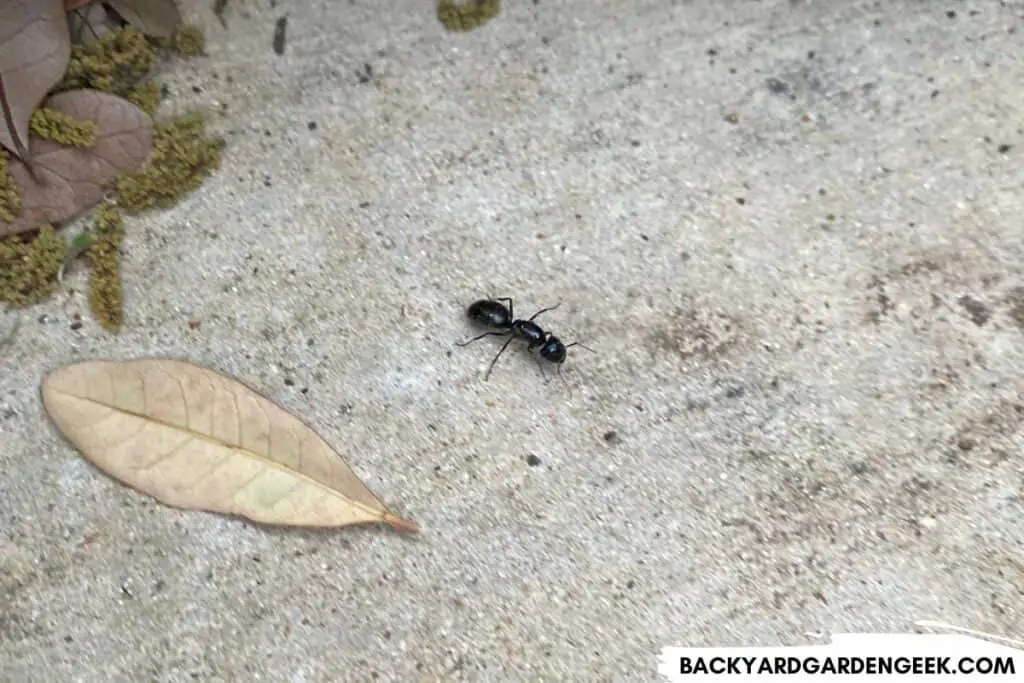
How to Kill Ants with Essential Oils While Keeping Dogs Safe
When purchasing lavender oil or cedarwood oil, make sure you buy them from a reputable source. Private sellers and small businesses often sell essential oils, but these products are not tested and can contain harmful ingredients that are not listed on the label.
Try avoiding these and also lean toward products that say “kid friendly” or “pet friendly” on the label.
Here’s how I make my pet-friendly, ant-repelling essential oil sprays:
Lavender Oil Ant Repellent
- Mix 2 cups of water and 20 drops of lavender oil in a spray bottle.
- Shake and spray.
Cedarwood Oil Pesticide and Repellent
- Mix 1 part water and 1 part white vinegar in a spray bottle.
- Add 15 drops of cedarwood oil for every 8 ounces (.24 liters) of water.
- Shake and spray.
Use these DIY sprays directly on surfaces, in entryways, and in cabinets. These solutions can also be sprayed on cotton balls and left in entryways to prevent future infestations.
You can use essential oils in the garden, but I often opt for other solutions, whether I’m going after ants or other garden pests like aphids, armyworms, caterpillars, spider mites, stink bugs, or white flies.
I’ve recently had success using neem oil to kill off ants, so take a look at my article to see that and other methods I tend to prefer outdoors. I really like peppermint oil sprays, but I’ll only use that if I know for sure my furry friends won’t be able to get near it.
One thing to remember: If you see ants outside in your garden, the ants are likely there because they’ve noticed that there are aphids hanging around your plants. Take a look at these articles if you think you might have aphids on your property.
- Do Aphids Attract Ants?
- Do Ants Eat or Kill Aphids? 6 Environmental Factors
- Do Ants Make Aphids Worse? 7 Behaviors to Understand
- Why Do Ants Protect Aphids? 7 Things You Should Know
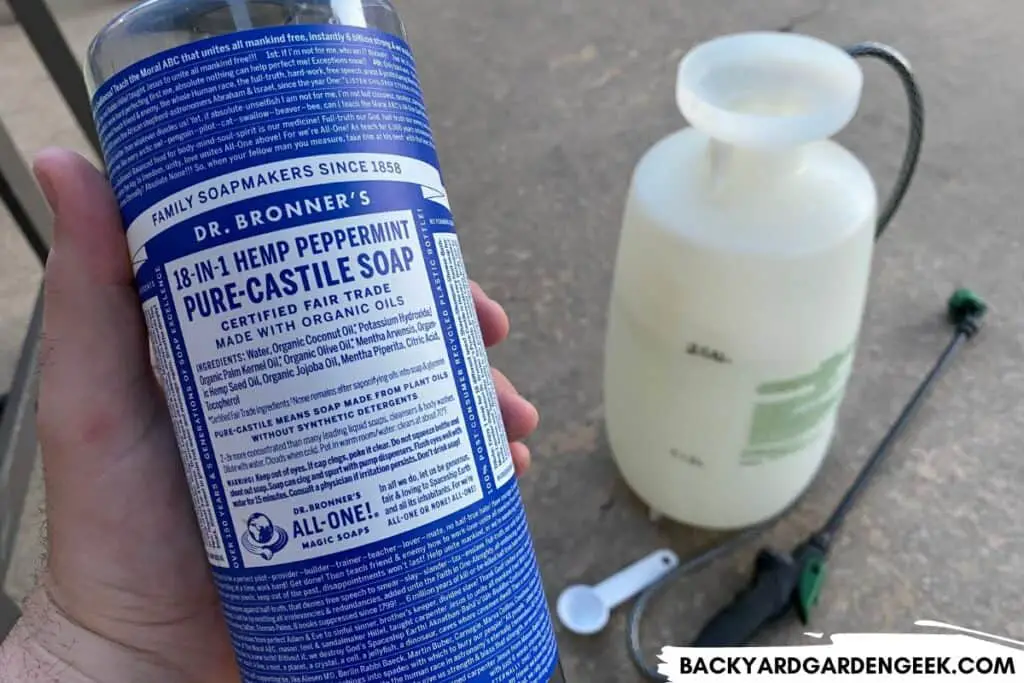
What Products Are Toxic for Ants But Not Dogs?
While I recommend lavender and cedarwood essential oils as a safe and effective way to kill and repel ants in your pet-friendly home, there are also a number of other common household products you can utilize.
Use any of these products alone or as a combination around your home and garden, and rest assured that the furry members of your family will be safe.
1. Baking Soda
Baking soda is a great short-term solution to ant infestations, and you probably already have some in your kitchen.
Mix baking soda with powdered sugar and water to attract the little pests. Ants won’t eat baking soda alone, but they will be attracted to the sweet sugar. Once they start eating the mixture, the baking soda will dehydrate and ultimately kill the ants.
The water will make this mixture stick to their feet, and they will track the baking soda to the rest of the colony. Goodbye ants!
Be aware that baking soda will kill ants, but it will not repel future infestations. Once your colony of ants is gone, you should use one of the repellents I’ve discussed to keep them away.
2. Castile Liquid Soap
Liquid soap acts similarly to baking soda. Mix the soap with water and prepare to say goodbye to your infestation.
Ants are attracted to a simple bowl of soapy water. Once they step in, the soap sticks to their bodies and pulls the moisture out, dehydrating and killing them. Like the baking soda, the ants will track this mixture to the rest of the colony before they die.
Here’s the recipe I use to make a quick and easy soapy water spray:
- 32 ounces (1 liter) of water
- 1 teaspoon (5 ml) of castile liquid soap
Just be sure to pour the water into the bottle first, then add the liquid soap. Otherwise, you’ll have a soapy, foamy mess to clean up!
3. Diatomaceous Earth
Diatomaceous Earth (also called DE) acts similarly to baking soda, but instead of dehydrating ants, it actually cuts into their exoskeletons. DE won’t hurt humans or furry friends, but this fine powder is actually terrible sharp to small insects and will kill them on contact.
Sprinkle some at the base of your plants or around ant-infested surfaces. The ants will step through the DE and track some of it back to the rest of the colony.
Diatomaceous earth works rather fast, so if you are still seeing ants after 72 hours of treatment, try reapplying.
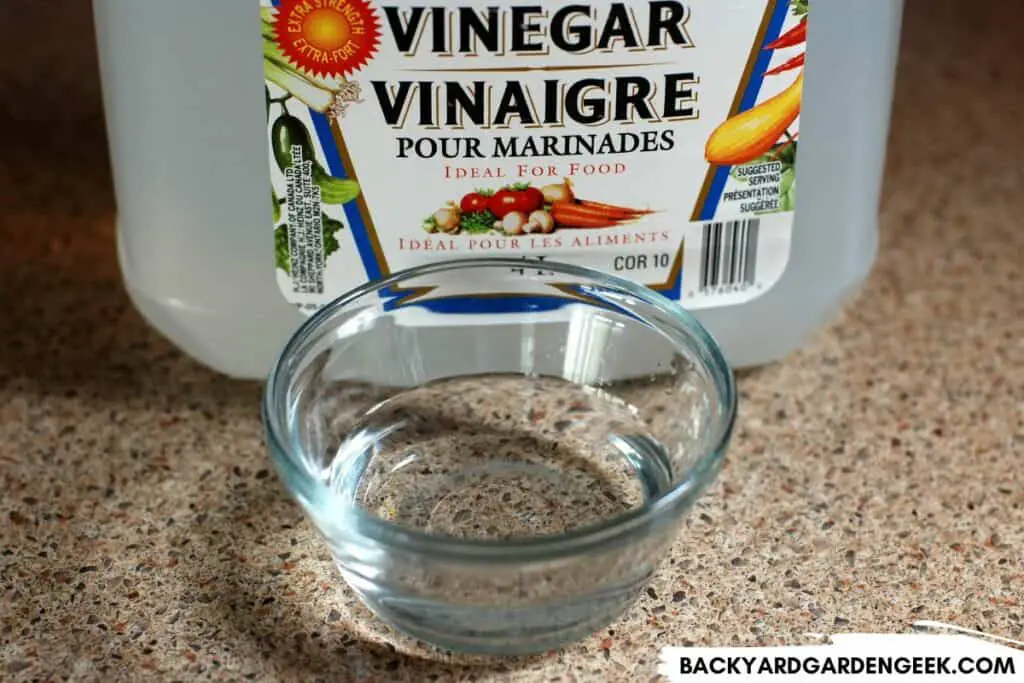
4. White Vinegar
White vinegar is a great ant repellant because of the strong scent, and it also acts as an effective cleaning agent.
Ants are sensitive to harsh smells, so spraying a mixture of water and vinegar around surfaces will deter ant infestations. You can also use this mixture to clean and sanitize surfaces around your home.
Never use concentrated vinegar on your surfaces since it’s harsh and can damage certain surfaces and even cause irritation to you and your pets. Always dilute before using vinegar inside your house or out in your garden.
The recipe I use is a simple one: Simply mix 1 part white vinegar with 1 part water in a spray bottle and spray in and around any ant infestations.
Additional Steps
You can prevent future ant infestations by following a few quick and easy tips:
- Once the infestation is gone, clean all surfaces thoroughly to remove ant trails, which will otherwise attract new ants.
- Take inventory of your cabinets and find out what the ants were attracted to.
- Temporarily relocate items that might attract them back to that location.
- Keep surfaces of your home clear of crumbs and spills.
- Leave diatomaceous earth at the base of plants in your garden and leave a cotton ball with lavender oil or cedarwood oil around entryways in your home
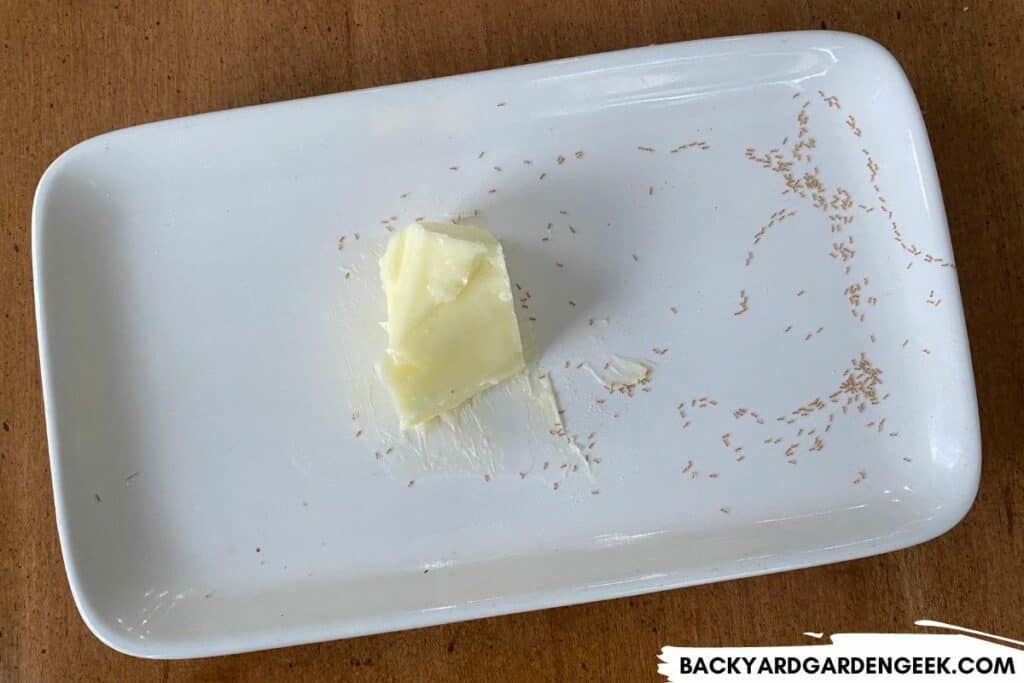
Now you know my secrets to keeping ants out of my house using essential oils and other preventative DIY methods that are safe for my furry friends.
Use any of these strategies (or combine them as needed) for protection against pesky invaders, and rest assured that you’ll be keeping your dogs safe!
Further Information
If you’d like to read more about how to handle ants inside your home or out in your garden, I recommend checking out these articles, especially because ants and aphids have a symbiotic relationship:
